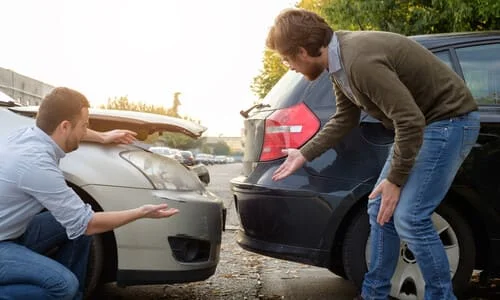 Disputing ‘fault’ in a personal injury case is a complex and often challenging process. To successfully dispute fault, you’ll need to rely on concrete evidence and reasoning. The other party involved in the accident may present their version of events, but it is your responsibility to counter their representations with factual information. Even if the evidence seems to point against you, you must strive to present compelling evidence and reasoning as to why this is not the case.
Disputing ‘fault’ in a personal injury case is a complex and often challenging process. To successfully dispute fault, you’ll need to rely on concrete evidence and reasoning. The other party involved in the accident may present their version of events, but it is your responsibility to counter their representations with factual information. Even if the evidence seems to point against you, you must strive to present compelling evidence and reasoning as to why this is not the case.
In some instances, disputing fault may require pushing back against an erroneous police report, or convincing an insurance company that you are not at fault by presenting strong evidence and a persuasive argument. Should these avenues prove insufficient, you may find yourself taking the matter to court, filing a lawsuit, or a legal motion to suppress certain evidence.
That said, in any situation it will be to your advantage to work with an attorney. Our team at Singh Ahluwalia Attorneys at Law is ready to help, and can provide a free, confidential, no-obligation case review to help you go over all your options. All you have to do is call (559) 878-4958 or contact us online to schedule your appointment today.
How Can I Appeal When I’m Considered At-Fault for a Car Accident?
An appeal is only necessary in the face of an insurance claim denial or an unfavorable jury verdict. However, an initial finding of fault can quickly steer your case towards either conclusion — or both. If you have reason to believe that you are being accused of fault, it is important to act quickly, preferably with the help of an experienced Fresno car accident attorney.
Disputing fault in a car accident is rarely a straightforward process. It can be an uphill battle, filled with challenges and obstacles. Insurance companies often have teams of skilled lawyers who will vigorously defend their interests, making it crucial for you to be prepared. Recognize that disputing fault may require significant time, effort, and resources on your part.
How Can I Use My Own Leverage to Strengthen My Case?
In the face of challenging circumstances, finding your own leverage becomes essential to strengthen your case. One example is compelling evidence. Collect as much evidence as possible, including photographs, witness statements, expert opinions, and any other relevant documentation that supports your version of events.
Additionally, consult with an experienced car accident attorney. They can provide valuable guidance, assess the strength of your case, and help you identify and leverage legal strategies to dispute fault effectively.
What If I Suspect The Other Party Has Provided Inaccurate Statements?
Throughout this process, you’ll need to scrutinize any statements made by the other party. Look for any inaccuracies or inconsistencies in their account of the events leading up to the accident. Pay attention to contradictions, false claims, or attempts to shift blame onto you. By identifying these inaccuracies, you can effectively challenge their version of events and strengthen your case.
Collecting Evidence
Of course, to truly counter the inaccurate representations made by the other party, you must gather compelling evidence of your own. In addition to collecting photographs, witness statements and expert opinions, you’ll also want to obtain copies of any official reports, such as police reports or accident reconstruction findings. Additionally, gather medical records and any other documentation that supports your position.
Presenting Evidence
You’ll need to present the evidence you’ve gathered in a clear and compelling manner. Create a timeline of the accident, outlining key details and incorporating the supporting evidence for each point. When presenting your evidence, be concise and focused, emphasizing the aspects that directly challenge the inaccuracies presented by the other party. Use visual aids such as photographs, diagrams, or charts to enhance the clarity of your presentation.
What If The Police Report Contains Errors?
In a car accident case, a police report can hold significant weight in determining fault. However, it’s crucial to understand that police reports are not infallible and can sometimes contain inaccuracies or biases.
Recognizing the impact of a biased or inaccurate police report will be an essential step in this attempt to dispute fault. A flawed report can unfairly shift blame onto you, so you’ll need to take the following steps to challenge its findings.
1. Review the Report and Identify Discrepancies
Carefully review the police report immediately after the accident. Look for any discrepancies, factual errors, or omissions that could affect the determination of fault. Pay attention to inaccurate statements, incorrect diagrams, or missing information regarding witnesses or key details of the accident. Note specific sections or statements that you believe are incorrect or biased.
2. Collect Additional Evidence to Support Your Case
To challenge a flawed police report effectively, gather additional evidence that contradicts or supplements the information contained in the report. Similar to the advice we provided above, you’ll want to make sure this evidence includes key witness testimonials and photographs wherever possible.
Additionally, if possible, try to obtain any available video footage, such as surveillance footage or dash cam recordings, that captures the accident from different angles. The goal is to present compelling evidence that supports your version of events and counters the inaccuracies in the police report.
3. Submit a Formal Request for a Corrected Report, If Necessary
If you identify significant inaccuracies or biases in the police report that could impact fault determination, consider submitting a formal request for a corrected report.
You’ll need to compile a clear and concise document outlining the specific errors or biases you have identified and provide supporting evidence to substantiate your claims. Submit this request to the relevant law enforcement agency (typically the police department that responded to the accident). Be prepared to present a compelling case for why the report should be amended.
Understanding the Insurance Company’s Role in Determining Fault
Ultimately, when disputing fault in a car accident you’re often going to need to deal with insurance companies head on.
Insurance companies typically conduct their own investigations to determine fault and decide on claims. Recognizing their influence can help you navigate the process more effectively and present a compelling argument in your favor.
To convince the insurance company that you are not at fault you’ll first need to provide clear, detailed information about the accident. Next, you’ll need to submit strong supporting evidence. Then, you’ll likely need to request a review of the decision — or escalate the claim.
How Do I Request a Review of an Insurance Company’s Decision?
Simply submit a formal request to the insurance company, outlining your disagreement with the fault determination. Provide a clear and concise argument supported by additional evidence. Then, ask for a comprehensive review of the decision.
How Do I Escalate the Claim?
If the insurance company refuses to reconsider their decision or does not provide a satisfactory response, you may need to escalate the claim. Contact a supervisor or claims manager within the company to express your concerns and request a higher-level review of the case. Be persistent and professional in your communications.
Remember to document all interactions with the insurance company, including dates, times, and the names of the individuals you speak with. This record can be valuable if you need to escalate the matter further or seek legal recourse.
Appealing Fault Determinations in Court
Eventually, it may become necessary to settle the final determination of fault in court. In court, a jury will play a pivotal role in deciding fault. That said, because juries consist of impartial individuals who listen to the evidence presented and make a determination based on the facts; it will be more important than ever to build a strong case.
The first thing you’ll need to do is thoroughly prepare and organize all evidence relevant to your case. Make sure all of your evidence is properly labeled and cataloged for easy reference during the trial.
Next, you’ll need to bring this evidence to life by crafting persuasive arguments that effectively challenge the opposing party’s version of events and highlight the strengths of your case. Make sure to clearly articulate why you believe the fault determination was incorrect and present counter arguments supported by the evidence you have gathered.
If an unfavorable verdict is returned, you may have another chance to appeal the verdict itself. In order to do so, you must be prepared to demonstrate how the court or jury erred in its application of the law, such as a failure to accurately describe jury instructions prior to deliberations. Civil case appeals can be incredibly difficult to form, file, and argue. Having an experienced attorney during this process is vital for increasing your chances of success.
Working with Your Car Accident Attorney to Navigate the Legal Process
Representing yourself in court is never going to be an easy process, especially if you’re arguing fault. In this scenario, it will be especially important to work closely with an attorney who is experienced in handling personal injury cases. Your attorney can guide you through the necessary steps and ensure compliance with court procedures and deadlines.
They can also provide valuable advice on the strengths and weaknesses of your case, help you prepare for court appearances, and assist in crafting compelling arguments. By collaborating with your attorney, you can navigate the legal process with greater confidence and increase your chances of successfully appealing the fault determination.
Plus, right from the get-go they can review your case and help you hone in on the right course of action. So if you’re hoping to appeal fault in a car accident, make sure you reach out to a qualified attorney.
At Singh Ahluwalia Attorneys at Law we’re ready to help, and here to provide you with a free, confidential, no-obligation case review to help you go over all your options. All you have to do is call (559) 878-4958 or contact us online to schedule your appointment today.


